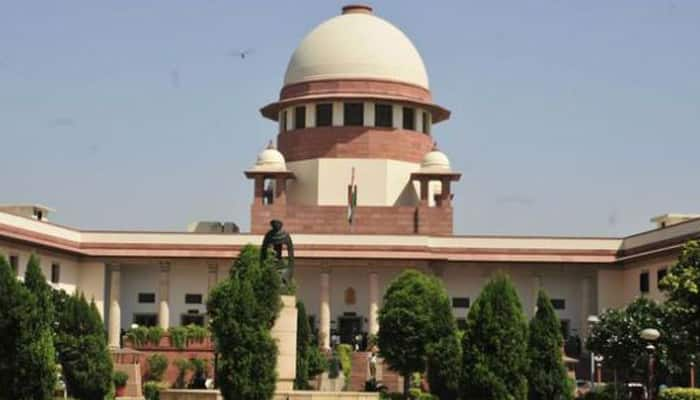New Delhi: In a verdict that could have far-reaching implications, the Supreme Court may pronounce on Thursday whether right to privacy is a fundamental right.
The verdict will have a bearing on the challenge to the validity of the Aadhaar scheme on the grounds of its being violative of the right to privacy.
It is also likely to have a bearing on the challenge to WhatsApp's new privacy policy.
The top court is hearing a challenge to the Delhi High Court's September 23, 2016 order by which it allowed WhatsApp to roll out its new privacy policy but stopped it from sharing the data of its users collected up to September 25, 2016, with Facebook or any other related company.
A nine-judge constitution bench headed by Chief Justice JS Khehar had on August 2 reserved its verdict after hearing marathon arguments for six days over a period of three weeks, during which submissions were advanced in favour and against the inclusion of the right to privacy as a fundamental right.
Also Read - Right to privacy debate: Important points
Besides CJI Khehar, the other judges of the nine-judge bench are Justices J Chelameswar, SA Bobde, RK Agrawal, RF Nariman, AM Sapre, DY Chandrachud, SK Kaul and S Abdul Nazeer.
The high-voltage hearing saw a battery of senior lawyers, including Attorney General KK Venugopal, Additional Solicitor General Tushar Mehta, Arvind Datar, Kapil Sibal, Gopal Subaramaniam, Shyam Divan, Anand Grover, CA Sundaram and Rakesh Dwivedi, advancing arguments either in favour or against the inclusion of right to privacy as a fundamental right.
The petitioners included former Karnataka High Court Judge KS Puttaswamy, first Chairperson of National Commission for Protection of Child Rights and Magsaysay awardee Shanta Sinha, feminist researcher Kalyani Sen Menon, and others.
Initially, on July 7, a three-judge bench had said that all issues arising out of Aadhaar should finally be decided by a larger bench and the Chief Justice of India would take a call on the need for setting up a constitution bench.
The matter was then mentioned before CJI Khehar who set up a five-judge constitution bench to hear the matter.
Also Read - Right to privacy debate: Chronology of events
However, the five-judge constitution bench on July 18 decided to set up a nine-judge bench to decide whether the right to privacy can be declared a fundamental right under the Constitution.
The decision to set up the nine-judge bench was taken to examine the correctness of two apex court judgements delivered in the cases of Kharak Singh and MP Sharma, decided by six and eight judge benches respectively, in which it was held that this right was not a fundamental right.
While the Kharak Singh judgement was delivered in 1960, the MP Sharma verdict was reported in 1950.
While reserving the verdict on August 2, the bench had voiced concern over the possible misuse of personal information in the public domain and said that protection of the concept of privacy in the all-pervading technological era was a "losing battle".
During the arguments, the bench had on July 19 observed that the right to privacy cannot be an absolute right and the state may have some power to put reasonable restrictions.
Also Read - Right to privacy should be on case-to-case basis, says SC
The Attorney General had also contended that right to privacy cannot fall in the bracket of fundamental rights as there were binding decisions of larger benches that it was only a common law right evolved through judicial decisions, as per IANS.
The Centre had termed privacy as a "vague and amorphous" right which cannot be granted primacy to deprive poor people of their rights to life, food and shelter.
The Centre contested their position citing two judgments of 1954 (by eight judges) and 1962 (by six judges) which had held that the right to privacy was not a fundamental right.
The Centre had contended that though after the mid-seventies several judgments by the benches of strength of two or three judges had held that right to privacy was fundamental but it was the judgment of 1954 and 1962 by the larger benches that holds the ground.
The high-profile arguments also saw the apex court asking searching questions about the contours of right to privacy in the digital age when personal information was randomly shared with all types of government and private entities.
The bench had wanted to know about the tests which could be used to regulate and enforce privacy right when there could be "legitimate or illegitimate" use of data.
Meanwhile, the petitioners had contended that the right to privacy was "inalienable" and "inherent" to the most important fundamental right which is the right to liberty, as per PTI.
They had said that right to liberty, which also included right to privacy, was a pre-existing "natural right" which the Constitution acknowledged and guaranteed to the citizens in case of infringement by the state.
On the other hand, BJP-ruled Maharashtra and Gujarat contended that right to privacy was not a fundamental right and those ruled by the Congress - Karnataka, Punjab, Himachal Pradesh, Puducherry and TMC in West Bengal asserted that privacy was a fundamental right.
The Unique Identification Authority of India too said that privacy was not a fundamental right and there were sufficient safeguards to protect data collected from the people - their iris scan and finger prints.
The apex court, during the hearing, favoured overarching guidelines to protect private information in public domain and said there was a need to "maintain the core of privacy" as the notion of privacy was fast becoming irrelevant in an all- pervading technological era.
(With Agency inputs)
















